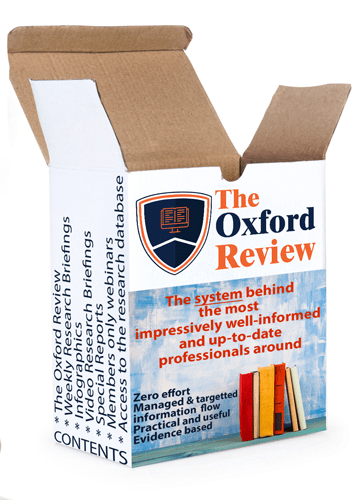- in Blog , Oxford Review by David Wilkinson
- |
- 1 comments
How to keep on top of your game without information overload

There is nothing more powerful or impactful than when you go to the doctors for example, and she or he says something like “The latest research on this says that….”.
Professionals at the top of their game and who can talk with ease about the latest research findings or some new thinking about a topic being discussed are deeply impressive. It is often these moments that stick in peoples minds. What isn’t impressive is when someone says “well I did a degree or a course on this five years ago but I don’t really know if there is anything new on this” or even worse giving an opinion about something and then when asked what the evidence is for that opinion mumbling something about “Oh it’s just my experience”.
Can you image your response if a doctor said that to you? That you got the feeling that they didn’t really know what the latest thinking and research was and that they weren’t up-to-date?
Being professional
Professionals take a pride in their craft. One of the distinctions between someone who just turns up at work everyday and a professional is that the professional takes their own professional knowledge seriously. Professionals never think they know it all.
Someone who thinks they know all there is to know about their area is someone who has stopped learning.
Professionals are always open to learning. Indeed true professionals are always on the quest to know and understand more, to continue to hone and master their craft. They take a pride in being right up-to-date and relevant.
Being knowledgeable and up-to-date with the latest thinking and research is one of the things that separates the true professional from the average employee.
true professionals … continue to hone and master their craft
Research
Did you know that over 78,000 new research studies are published every month, month in month out all year round. 78,000! Thats approximately 2,600 new research papers published every day…. and that number is increasing at a rate of 9% every year. That’s a 9% increase of research findings over and above the 9% increase from last year and the year before and so on.
There isn’t one area of human endeavour that stays still, that there aren’t new findings and realisations going on all the time. New and proper research papers are being published daily about leadership, management, HR, L&D, coaching and just about every topic to do with organisational development you can think of, every day.
And when I say proper research I don’t mean a blog or article on LinkedIn about a bright new idea someone had as they got out of the shower this morning. These aren’t opinion pieces. These 2,600 papers published every day or 78,000 new research papers published every month are peer reviewed studies conducted by full-time researchers based in some of the best universities around the world. Places like my own university at Oxford or Harvard or Stanford, or Cambridge, MIT etc.
Approx 2,600 new research papers are published every day
I can’t keep up – excuses for not keeping up-to-date
Of course with the sheer quantity of research being carried out and the amount of new knowledge and understanding being generated it would be easy to think – there is no way I can keep up with that. So what many people do is …. well nothing. They don’t even bother and as a consequence they fall behind and quickly get out of touch. It is this ability to systematically stay up-to-date with the latest thinking and research that distinguishes a true professional from someone who is an employee who is just coming to work doing what they are told and going home again.
The average employee makes excuses like “I’m too busy”, or “I pick enough up from LinkedIn or the internet” or “I know all there is to know about my area” or “I pick up what I need to know as I go along” or “They will train me if I need to know” and this is my favourite excuse for not keeping up-to-date “I’m intelligent, I can work most things out, I don’t need to be told, you just need to use logic”.
And to be fair, this “I don’t take my development seriously enough to keep up-to-date” mind-set (because that in effect is what they are saying) ‘I don’t need to or I’m not professional enough to stay up-to-date’, is really easy.
It’s really easy for these people because what they can’t see, they don’t know about and what they don’t know about, in their own minds at least doesn’t exist… and if it doesn’t exist (in their world) there isn’t anything new to have to bother about.
With a mind-set like this the world becomes a nice predictable and comfortable place where nothing new challenges them… and the important point here is that not knowing about the latest thinking and research means that their existing knowledge and understanding doesn’t get to be challenged. This makes everything is all nice and comfortable and predictable.
… what they can’t see, they don’t know about and what they don’t know about, in their own minds at least doesn’t exist…
Wilful blindness
It’s a form of wilful blindness of course that keeps people in their comfort zone and keeps them stuck in old habits, old knowledge, old paradigms, old ways of thinking and old solutions. But at least it doesn’t challenge them or their thinking. It’s what the scientists call ‘ego defence’. This way they don’t need to change. And it is amazing how far people will go to construct a world around themselves that stays the same, where there is no change or challenge to their knowledge or thinking.
Denial is a very powerful way of remaining the expert. Only of course it isn’t. Just because someone has constructed a world (by being too busy, or too senior, or or or you get the picture) where little changes, where there is little to challenge their thinking, doesn’t mean that there aren’t new things, new findings, new research, new knowledge, new ways to see or think about things or new solutions out there. It just means we are protecting ourselves from change by not staying up today and making excuses about why we don’t stay up-to-date.
All these excuses are just ways of staying comfortable and if you are thinking about now – yes but I am too busy to keep up-to-date or I don’t have the time, then stop reading/listening to this right now because you really aren’t going to like what I am about to say.
It’s a form of wilful blindness of course that keeps people in their comfort zone and keeps them stuck in old habits, old knowledge, old paradigms, old ways of thinking and old solutions…
You
Ok that’s probably got rid of the change deniers! The very fact that you have read/listened this far and the fact that that you are still here at all, strongly suggests that you are a seeker. That you want to be challenged, that you are viewing things professionally. You know that change is happening continually and that you want to be at the front of that change, not lagging months or even years behind the curve. You are probably the kind of person who always wants to know what is new and what the latest thinking and research is. You actively want and like the current thinking and practice to be challenged. You actually want to be up-to-date and most probably like thinking and like being at the forefront of change.
Reality
However there is a reality here, like most professionals you will be busy and don’t have a whole lot of time to trawl through all the research just to find the useful and relevant stuff. Can you image how long it would take to trawl through all the latest research every day all 2,600 studies that are published daily? Well let me tell you as someone who does this for a full time job – it is a full time job and actually it takes an entire team of people to view, read and find the latest relevant and practical thinking and research as it is published. Then there is the small problem of understanding and deciphering the papers and turning them into something digestible and useful.
Having a system
One of the things about the professionals who are at the forefront of their area is that they have a system that keeps them up-to-date and well-informed with the minimum of effort. Kind of personal a continual professional development automation system that brings the right knowledge to them in bite sized chunks so they don’t get overwhelmed and that provides a library function so they can get back to things quickly and easily when they need to.
These professionals, just like the doctor who impressed us with their knowledge of the latest research, have a system that filters out the rubbish and noise and just provides pertinent, useful, practical and up-to-date thinking and research in their area as it is published, not months or years later.
Their system keeps them right up to date with almost no effort, it’s a system after all and it runs on automatic. They don’t need to think about it, it just keeps them up-to-date with a slow continual drip of information and thinking that is manageable and deeply impressive.
Having a system like that enables these true professionals to remain powerfully well-informed and current whilst still being able to focus on their job and their lives. Their system just works automatically in the background. It filters out the opinion, the unfounded ideas and ‘noise’, and brings them (without any effort) just the very latest research, evidence based thinking and findings in a way that is easily digestible and acts like a fast reference library so that they can get on and be at the forefront of their profession. They don’t need to do anything. It just happens.
…professionals who are at the forefront of their area is that they have a system that keeps them up-to-date and well-informed with the minimum of effort…
The Oxford Review is that system for 1,000’s of professional leaders, managers, HR, L&D, executive coaching and organisational development professionals around the world. Be impressively up-to-date with the Oxford Review and get the system that will just work in the background to push to you a slow steady and manageable drip of the very latest thinking and research to keep you right at the forefront of your area.
Start today and get the system behind you right now.
You can then get straight back to work and leave the rest up to us. We will then drip feed you the very latest research briefings, video research briefings, infographics, tools, thinking in the areas of leadership, management, HR, Learning, coaching and organisational development so that you can focus on being the at the forefront of your profession.






2breaking